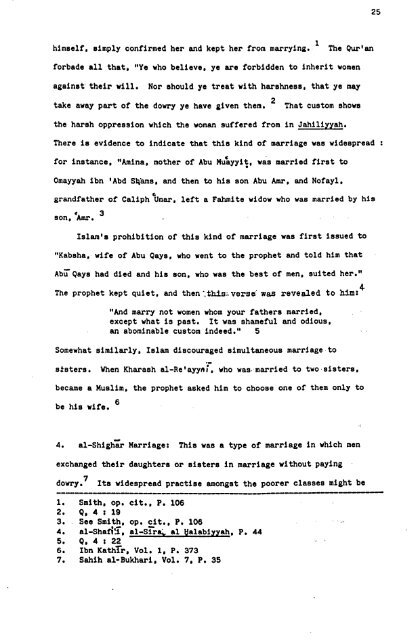Download - University of Salford Institutional Repository
Download - University of Salford Institutional Repository
Download - University of Salford Institutional Repository
Create successful ePaper yourself
Turn your PDF publications into a flip-book with our unique Google optimized e-Paper software.
himself, simply confirmed her and kept her from marrying,<br />
I The Qurlan<br />
forbade all that. "Ye who believe. ye are forbidden to inherit women<br />
againstýtheir will. Nor should ye treat with harshness, that ye may<br />
take away part <strong>of</strong> the dowry ye have given them. 2 That custom shows<br />
the harsh oppression which the woman suffered from in Jahiliyyah.<br />
There is evidence to indicate that this kind <strong>of</strong> marriage was widespread<br />
for instance, "Amina, mother <strong>of</strong> Abu Mulayyit. was married first to<br />
9<br />
Omayyah ibn 'Abd Slýams, and then to his son Abu Amr. and N<strong>of</strong>ayl.<br />
c<br />
grandfather <strong>of</strong> Caliph Umar. left a Fahmite widow who was married by his<br />
4<br />
son. Amr.<br />
Islam's prohibition <strong>of</strong> this kind <strong>of</strong> marriage was first issued to<br />
"Kabsha, -wife <strong>of</strong> Abu Qays, who went to the prophet and told him that<br />
Abu Qaya had died and his son, who was the best <strong>of</strong> men. suited her. "<br />
The prophet kept quiet, and then *. this. -.. verse was revealed to him: 4-<br />
"And marry not women whom your fathers married,<br />
except what is past. It was shameful and odious,<br />
an abominable custom indeed. " 5<br />
Somewhat similarly. Islam discouraged simultaneous marriage-to<br />
sisters. When Kharash al-RelayyAj. who was. -married to two-sisters,<br />
became a Muslim. the prophet asked him to choose one <strong>of</strong> them only to<br />
be his wife.<br />
6<br />
4, al-Shigt;; r Marriage: This was a type <strong>of</strong> marriage in which men<br />
exchanged their daughters or sisters in marriage without paying -<br />
dowry. 7<br />
Its widespread practise amongst the poorer classes might be<br />
1. Smith. op. cit., P. 106<br />
2. Q6 4: 19<br />
3.<br />
- See Smith. op. cit.. P. 106<br />
4. al-Shafi! r, al-Siraý al Ualablyyah. P. 44<br />
5. Q, 4: 22<br />
6, Ibn KathTr, Vol* 1, P. 373<br />
7. Sahih al-Bukhari. Vol. 7, P. 35<br />
25
















